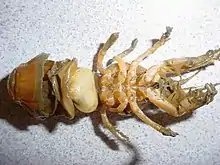Neaeromya rugifera
Neaeromya rugifera is a species of bivalve that inhabits the West Coast of North America.[1]
| Neaeromya rugifera | |
|---|---|
 | |
| Neaeromya rugifera on the underside of Upogebia pugettensis | |
| Scientific classification | |
| Domain: | Eukaryota |
| Kingdom: | Animalia |
| Phylum: | Mollusca |
| Class: | Bivalvia |
| Order: | Galeommatida |
| Family: | Lasaeidae |
| Genus: | Neaeromya |
| Species: | N. rugifera |
| Binomial name | |
| Neaeromya rugifera (Carpenter, 1864) | |
| Synonyms | |
| |
Description
Neaeromya rugifera is a species of symbiotic bivalve that can be found on the abdomen of Upogebia pugettensis and on the ventral surface of Aphrodita, a genus of polychaete worm. They can attach and detach themselves at will using their byssus.[2][3] The largest examples of the species were found to be 6mm in length, 2.5mm in height, and 1.5mm in width. N. rugifera do possess teeth, but no chondrophore. One investigation of stomach contents found remains of diatoms and protozoans.[3] Sexual dimorphism is seen as female N. rugifera being larger than their male counterparts.[3] Males can be found to reside in the mantle cavity of females.[2] A 2008 study found no evidence of N. rugifera causing weight loss in U. pugettensis.[4]
Distribution
Neaeromya rugifera is spread across the West Coast, from Kodiak, Alaska, to Punta Rompiente, Baja California.
References
- "WoRMS - World Register of Marine Species - Neaeromya rugifera (Carpenter, 1864)". www.marinespecies.org. Retrieved 2020-02-12.
- "Pseudopythina rugifera". inverts.wallawalla.edu. Retrieved 2020-02-12.
- Narchi, Walter (1969). "On Pseudopythina rugifera (Carpenter, 1864) (Bivalvia)". The Veliger. 12 (1): 43–52.
- Smith, Andrew E.; Chapman, John W.; Dumbauld, Brett R. (2008). "Population structure and energetics of the bopyrid isopod parasite Orthione griffinis in mud shrimp Upogebia pugettensis". Journal of Crustacean Biology. 28 (2): 228–233. doi:10.1651/0278-0372(2008)028[0228:PSAEOT]2.0.CO;2.